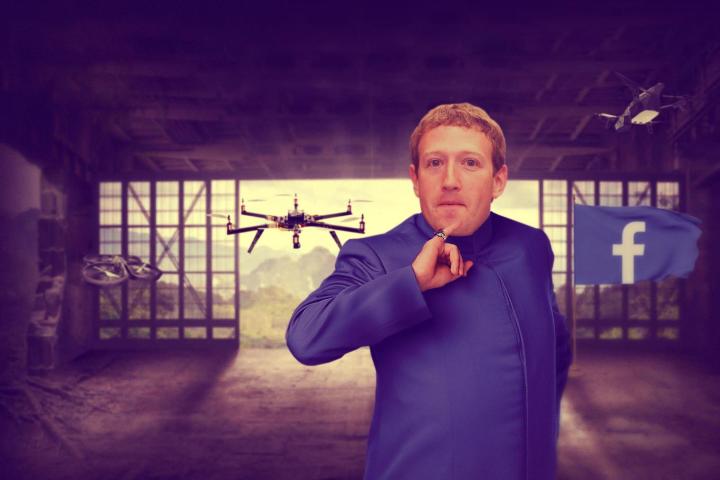
Mark Zuckerberg may be on the cusp of something great – or something sinister.
“In our effort to connect the whole world with Internet.org, we’ve been working on ways to beam Internet to people from the sky,” Zuckerberg wrote in a Facebook post on Thursday. “Today, we’re sharing some details of the work Facebook’s Connectivity Lab is doing to build drones, satellites and lasers to deliver the Internet to everyone.”
I don’t know if the Facebook CEO is actively trying to not sound like an evil super-villain from a James Bond movie.
That’s right – drones, satellites, and lasers!
I don’t know if the Facebook CEO is actively trying to not sound like an evil super-villain from a James Bond movie. But in the off chance that he is, perhaps avoiding this particular word grouping would be a good idea. This is especially true considering the public’s general reaction to Facebook (read: Zuckerberg) buying Oculus VR, maker of the Rift virtual-reality headset. To sum it up: People really dislike Facebook. They see it as a force of bad in our world, or at least a force of lame. Which explains why a Zuckerberg-backed plan to deploy an army of drones, satellites, and lasers strikes this author as, well, a bit creepy.
Of course, there’s likely nothing creepy or sinister about it. As of 2013, an average of only 39 percent of the world’s population has Internet access, according to International Telecommunications Union estimates (PDF). For the developed world, that number is much higher – about 77 percent – compared to the developing world, where just 31 percent can get online.
What Zuckerberg aims to do through the Internet.org coalition, which includes companies like Ericsson, Samsung, Qualcomm, and Nokia in its ranks, is bring these Web-withouts into the 21st century by blanketing the entire planet in Wi-Fi. Google has a similar ambitious plan in the works – but instead of solar-powered drones and lasers, it’s using giant balloons and specialized antennas.
Is that so wrong?

Of course, cynics will tell you that, in the case of both Facebook and Google (and any other company involved), efforts for global Wi-Fi access are only “semi-altruistic” as Recode’s Mike Isaac put it, since more people online likely means more revenue-generating users for them.
But so what? Just as automotive manufacturers, tire makers, gas-station owners, and other pro-driving profiteers pushed for the creation of new roads (and later the national highway system) in the early 1900s, so too are Internet companies and hardware makers laying the groundwork (skywork?) for the next generation of Web surfers. Simply because the motivations for spreading Internet access around the globe are, almost certainly, fueled by profit motives doesn’t make the results any less beneficial to those who reap the rewards of a Wi-Fi connection.
On the flip side, however, we are seeing the potential for increasing consolidation of power on the Internet. Google has a massive head start, and accounts for some 25 percent of all North American Internet traffic as of 2013, according to Internet monitoring firm Deepfield – more than Facebook, Twitter, and Netflix combined. Facebook, it is safe to assume, would love to make those numbers more even – and the work of the Connectivity Lab is surely part of that plan.
On the flip side, however, we are seeing the potential for increasing consolidation of power on the Internet.
To help accomplish its goal of providing global Internet access, Facebook has reportedly purchased “drone” maker Titan Aerospace, according to CNBC and TechCrunch, whose solar-powered Solara 60 unmanned aircraft can remain aloft for up to five years. Perhaps more importantly, it can fly at altitudes that put it outside the reach of government regulations. With experts from Ascenta, NASA’s Jet Propulsion Laboratory, NASA’s Ames Research Center, and the National Optical Astronomy Observatory, all working on Connectivity Labs projects, it would be unwise to brand these efforts as untenable.
If Facebook succeeds, that would present us with a situation in which a near-30-year-old billionaire, who’s known for brushing aside personal privacy concerns for business success, holds the keys to the Internet for billions of people around the world – many of whom, I must imagine, have far greater things to worry about than metadata collection and the creeping rise of insanely accurate facial recognition software.
If that doesn’t have the ingredients for the making of a global super-villain, I don’t know what does.
This will be Andrew Couts’s last column for Digital Trends, but you can follow him on Twitter as he continues to cover the intersection of technology and policy.


